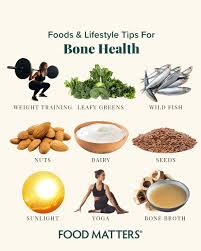How to Improve Bone Health with Diet and Exercise
Bone health is important for everyone, regardless of age. Strong bones help us stay active and prevent injuries like fractures. Poor bone health can lead to conditions like osteoporosis, where bones become weak and brittle. Thankfully, improving bone health is something you can achieve through simple changes in diet and exercise.
This article will guide you through the best ways to keep your bones strong and healthy.
Why Is Bone Health Important?
Bones provide support for our bodies, protect our internal organs, and allow us to move. They are made of living tissue that constantly rebuilds itself. However, as we age, bone loss can occur, making it essential to maintain good bone health.
Risk Factors for Poor Bone Health
Some factors can increase the risk of weak bones:
- Aging: Bone density decreases naturally as we grow older.
- Lack of nutrients: Not enough calcium and vitamin D can weaken bones.
- Lifestyle choices: Smoking, excessive alcohol, and lack of exercise can harm bone health.
- Medical conditions: Certain illnesses or medications may affect bone density.
Understanding these risks can help you take action early.
The Role of Diet in Bone Health
Eating the right foods is one of the best ways to strengthen your bones. A balanced diet provides the nutrients your bones need to grow and stay strong.
Key Nutrients for Bone Health
-
Calcium
Calcium is the building block of bones. It helps maintain bone structure and strength. Adults typically need about 1,000–1,200 mg of calcium daily.- Foods rich in calcium:
- Dairy products like milk, cheese, and yogurt
- Leafy greens like kale, spinach, and broccoli
- Fortified foods like orange juice or plant-based milk
- Foods rich in calcium:
-
Vitamin D
Vitamin D helps your body absorb calcium. Without enough vitamin D, even a high-calcium diet won't benefit your bones.- Sources of vitamin D:
- Sunlight exposure
- Fatty fish like salmon and mackerel
- Egg yolks
- Fortified cereals and milk
- Sources of vitamin D:
-
Protein
Protein is important for bone repair and growth. A moderate amount of protein in your diet can support bone health.- Good sources:
- Meat, poultry, and fish
- Beans, lentils, and tofu
- Nuts and seeds
- Good sources:
-
Magnesium and Potassium
These minerals help maintain bone density by supporting calcium absorption.- Magnesium-rich foods: Nuts, seeds, whole grains, and dark chocolate
- Potassium-rich foods: Bananas, sweet potatoes, and oranges
Foods to Avoid
Some foods and drinks can harm bone health:
- High salt intake: Too much sodium can cause calcium loss.
- Sugary drinks: Soda and other sugary drinks can reduce bone density.
- Excessive caffeine: Too much coffee or tea may interfere with calcium absorption.
The Role of Exercise in Bone Health
Physical activity is just as important as diet for maintaining strong bones. Regular exercise helps improve bone density, strength, and balance, reducing the risk of fractures.
Best Exercises for Bone Health
-
Weight-Bearing Exercises
These exercises force your bones to work against gravity, which strengthens them.- Examples:
- Walking
- Jogging
- Dancing
- Hiking
- Examples:
-
Strength Training
Lifting weights or using resistance bands strengthens both muscles and bones.- Examples:
- Weightlifting
- Bodyweight exercises like push-ups and squats
- Examples:
-
Balance and Flexibility Exercises
Improving balance reduces the risk of falls, which can lead to fractures.- Examples:
- Yoga
- Tai chi
- Pilates
- Examples:
How Much Exercise Is Enough?
Experts recommend at least 30 minutes of weight-bearing or resistance exercises most days of the week. Even short sessions can make a difference when done regularly.
Lifestyle Tips for Better Bone Health
Besides diet and exercise, other habits can help maintain strong bones:
-
Avoid Smoking and Limit Alcohol
Smoking weakens bones, while excessive alcohol can interfere with calcium absorption. -
Maintain a Healthy Weight
Being underweight or overweight can strain your bones and increase the risk of fractures. -
Get Regular Check-Ups
Bone density tests can help identify early signs of osteoporosis. Speak with your doctor about your risk and whether supplements might help. -
Spend Time Outdoors
Exposure to sunlight helps your body produce vitamin D naturally.
Sample Meal Plan for Bone Health
Here’s a simple meal plan packed with bone-strengthening nutrients:
Breakfast
- Scrambled eggs (with spinach and cheese)
- Whole-grain toast
- A glass of fortified orange juice
Lunch
- Grilled chicken salad with kale, almonds, and a lemon dressing
- A side of yogurt
Snack
- A handful of mixed nuts and dried apricots
Dinner
- Baked salmon with roasted sweet potatoes and steamed broccoli
- A glass of milk
Dessert
- A small piece of dark chocolate
This plan is rich in calcium, vitamin D, and other essential nutrients to support bone health.
Conclusion
Taking care of your bones doesn’t have to be complicated. A diet rich in calcium, vitamin D, and other key nutrients, combined with regular exercise, can help you maintain strong bones throughout your life.
Start with small changes, like adding more leafy greens to your meals or going for a daily walk. Over time, these habits will improve your bone health and overall well-being. Remember, healthy bones are the foundation for a strong, active, and happy life!
href="https://https://slickquiver.com/kpy542ijrm?key=374ad52b1da5daf69e0cea67de52cbfc.googleusercontent.com/img/b/R29vZ2xl/AVvXsEjaf1OJgCefia6NfTBU-4LlrTSXAGgG75okcnSmSSJZ1r19fhrPfmkrTHwfZmn7c-1zYdY6HOLCue8ifnKLtmg5qBetKHxFvWqhFNvPr4vQMR1TJloXkofXu2-M4zrJ74GXr-YgVZbO2fvWniEpUslpuP2BP9OSLHr3SwwyFL8GN6xoarKM6NtuRxiEoeRZ/s900/avi0s2aqc.webp" imageanchor="1" style="margin-left: 1em; margin-right: 1em;" target="_blank">







